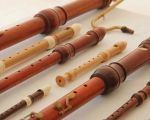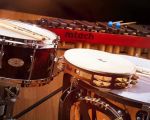- 1. Why Choose a Classical Guitar for Intermediate Players?
- 2. Key Features to Look for in Intermediate Classical Guitars
- 3. Top Picks for Intermediate Classical Guitar Players
- 4. How to Choose the Right Classical Guitar for You
- 5. Common Mistakes to Avoid When Buying an Intermediate Classical Guitar
- 6. Real-Life Experiences and Recommendations
1. Why Choose a Classical Guitar for Intermediate Players?
Classical guitars are distinct from their acoustic and electric counterparts in both their design and the way they are played. They are known for their nylon strings, wide necks, and rich, resonant sound, which make them ideal for classical music, flamenco, and fingerstyle guitar techniques. For intermediate players who have mastered the basics of guitar playing and are looking to expand their skill set, a classical guitar offers a unique combination of comfort, versatility, and tonal quality.
Choosing a classical guitar as an intermediate player allows you to further develop important techniques such as fingerpicking, arpeggios, and intricate chord progressions. The wider neck of classical guitars provides more space for finger placement, making it easier to execute advanced techniques compared to other types of guitars. The mellow tones produced by the nylon strings also make it a perfect choice for those who want to focus on precision and technique over sheer volume or distortion.
For those transitioning from beginner to intermediate level, investing in a quality classical guitar can make a significant difference in your learning journey. Whether you are playing classical compositions or contemporary pieces, a well-chosen classical guitar can help you refine your playing and enhance your overall musical expression.
2. Key Features to Look for in Intermediate Classical Guitars
When selecting a classical guitar as an intermediate player, there are several key features you should consider to ensure you are getting an instrument that suits your level and playing style. Below are the most important factors to evaluate when buying a classical guitar:
- Neck and Playability: As an intermediate player, you should look for a guitar with a neck that feels comfortable to play. A wider neck with a flatter profile is typical of classical guitars, which can provide more room for intricate fingerwork. Make sure the neck is smooth and easy to maneuver, with a comfortable action that doesn’t require excessive force for pressing the strings.
- Body Shape and Size: Classical guitars come in various body shapes and sizes, and the size of the guitar can affect comfort and sound quality. A smaller body may be easier for those with smaller hands or shorter arms to handle, while a larger body provides a fuller tone. It's important to choose a size that suits your physical attributes and playing style.
- Wood Quality: The wood used in a classical guitar significantly influences its sound. For intermediate players, choosing a guitar with solid tonewoods, such as cedar or spruce for the top, and rosewood or mahogany for the back and sides, will produce a rich, balanced tone that’s essential for more advanced playing. Solid wood guitars tend to age better and offer improved resonance compared to laminate guitars.
- String Tension and Type: The tension of the strings plays a big role in how the guitar feels to play. For intermediate players, medium tension strings are typically the best choice as they offer a good balance between ease of playability and tonal richness. Nylon strings are common in classical guitars, with some players opting for a mixed set of nylon and carbon strings for added brightness.
- Budget: While budget shouldn’t be the only consideration, it’s important to find a guitar that offers great value within your price range. Intermediate classical guitars come in a wide price range, so it’s essential to strike a balance between quality and affordability. While premium models may offer better tonal quality and craftsmanship, there are many mid-range guitars that still offer great sound and playability for a fraction of the cost.
3. Top Picks for Intermediate Classical Guitar Players
Now that you understand the key features to look for, let's explore some of the best classical guitars for intermediate players. These guitars offer excellent craftsmanship, impressive tonal quality, and the durability needed to support your growing skills:
1. Cordoba C5-CET
The Cordoba C5-CET is a fantastic option for intermediate players seeking a high-quality yet affordable classical guitar. It features a solid Canadian cedar top and a thin, comfortable neck for easier playability. The built-in pickup system also makes it a great choice for those who want to perform live or amplify their sound. Its well-balanced tone and smooth finish make it a standout in the mid-range price bracket.
2. Yamaha C40II
Yamaha has long been recognized for producing reliable and well-crafted guitars at affordable prices. The C40II is a great entry-level to intermediate guitar, featuring a solid spruce top and a nato back and sides. It provides a bright, clear tone that’s perfect for classical and folk music. Although it’s priced lower than many other guitars in its class, it offers exceptional value for the price.
3. Alhambra 4P
For intermediate players looking to upgrade to a more professional-level instrument, the Alhambra 4P is an excellent choice. Made in Spain, this guitar boasts a solid cedar top and rosewood back and sides, producing a warm and full-bodied sound. The craftsmanship is top-notch, and the guitar has a smooth, responsive action. This model is highly regarded for its clarity and dynamic range, making it perfect for a variety of playing styles.
4. La Patrie Etude
The La Patrie Etude is a Canadian-made classical guitar that offers a bright, rich tone at a reasonable price. It features a solid cedar top and a mahogany neck, providing both warmth and clarity in its sound. The guitar’s construction is solid, and it’s well-suited for intermediate players who want a reliable instrument with great playability and tone quality.
4. How to Choose the Right Classical Guitar for You
Choosing the right classical guitar is a personal decision that depends on several factors, including your playing style, budget, and preferences. Here are some steps to help you make an informed choice:
- Consider Your Playing Style: If you primarily play classical or flamenco music, you'll want a guitar with a rich, resonant tone that supports fingerpicking and intricate melodies. For more modern or folk styles, you might prefer a guitar with brighter tones that suit a wider range of genres.
- Test the Guitar in Person: If possible, test out guitars in person at a local music store. This will allow you to feel the guitar’s neck, body, and weight, and get a sense of how it feels in your hands. Pay attention to the comfort of the neck and the responsiveness of the strings.
- Consult Reviews and Recommendations: Look for reviews and recommendations from other intermediate players who have used the guitars you are considering. Their insights on the guitar’s playability, tone, and durability can be invaluable when making your decision.
5. Common Mistakes to Avoid When Buying an Intermediate Classical Guitar
While shopping for an intermediate classical guitar, there are a few common mistakes that can lead to regret down the road:
- Overlooking Comfort: Don’t just focus on the appearance or price of the guitar. Comfort and playability are key factors that will impact your ability to improve and enjoy playing. Make sure the guitar fits well in your hands and feels comfortable to play.
- Choosing Based on Price Alone: While budget is important, don’t make the mistake of choosing the cheapest option without considering the overall quality. A lower-priced guitar might lack the tone, durability, and features you need for growth as an intermediate player.
- Ignoring Setup and Maintenance: Ensure that the guitar is properly set up before buying, and be prepared to maintain it over time. A guitar that’s not properly set up can cause unnecessary frustration, especially for intermediate players looking to hone their skills.
6. Real-Life Experiences and Recommendations
Many intermediate players have shared their experiences and recommendations when it comes to selecting the perfect classical guitar. For instance, Mark, a guitar enthusiast from California, shared how upgrading to an Alhambra 4P significantly improved his playing. He noted that the guitar’s full-bodied sound and smooth action made complex fingerpicking techniques much easier to execute. Similarly, Lucy, an intermediate classical guitarist from New York, opted for a Yamaha C40II for its excellent tone at an affordable price. She appreciated how the guitar helped her refine her technique without breaking the bank.
These real-life experiences highlight the importance of selecting a guitar that fits your personal needs and playing style. Whether you choose a budget-friendly model like the Yamaha C40II or invest in a more professional instrument like the Alhambra 4P, finding the right guitar will help you progress as an intermediate player and enhance your overall musical expression.
For more guidance on selecting the best classical guitar for intermediate players, visit Beat Trigger, where we provide expert recommendations, tips, and products to help you make an informed choice.








